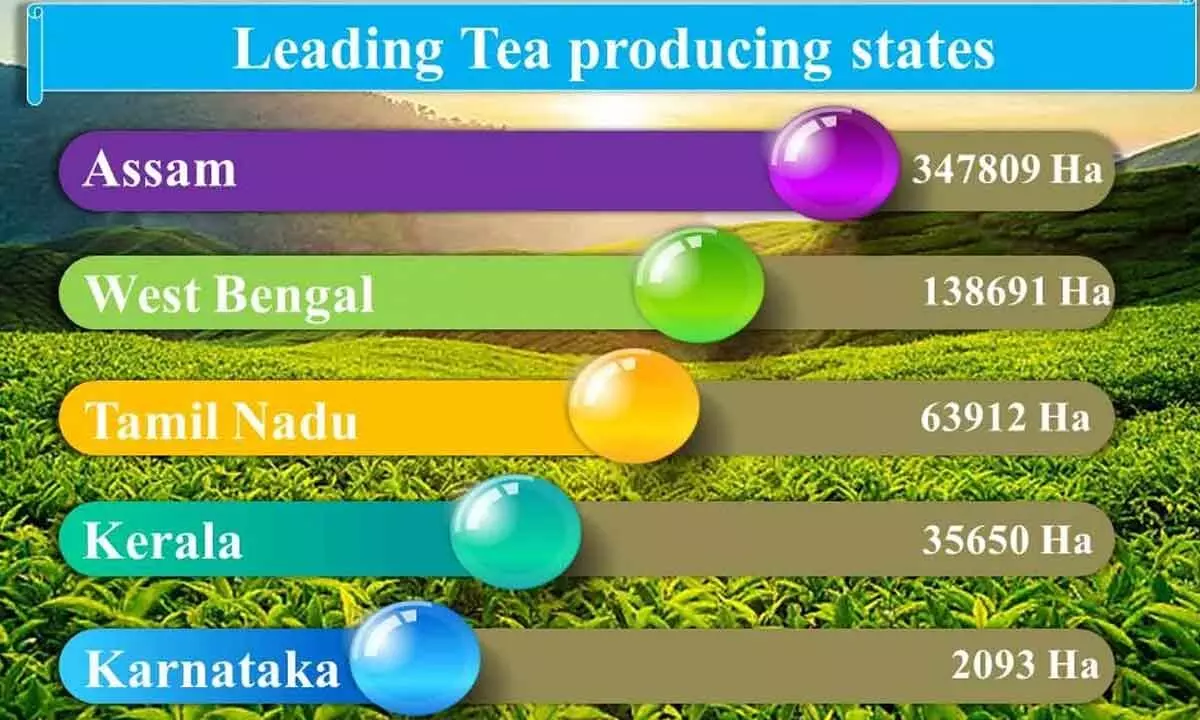Time to raise a toast to India’s growing tea market
Regular team consumption lowers cholesterol levels in the blood and facilitates healthy weight management
image for illustrative purpose

Tea manufacturers are using multi-layered packaging to store and distribute tea and minimize the instances of adulteration, spoilage and maintaining the fragrance and freshness of the tea leaves
The India tea market size reached $11.1 billion in 2023. Looking forward, the IMARC Group expects the market to touch $14.7 billion by 2032, exhibiting a growth rate (CAGR) of 3.18% during 2024-2032. The increasing consumer preference for premium and packaged tea brands, expansion of online retail channels, and awareness regarding the health benefits offered by tea represent some of the key factors driving the market.
Revenue from home (generated in supermarkets and convenience stores) in the tea market amounts to $13.2 bn in 2024, while revenue out-of-home (generated in restaurants and bars) comes to $3.6 bn. The former is expected to grow annually by 3.05% (CAGR 2024-2028). In global comparison, China tops in revenue at home.
The tea market is expected to show a volume growth, at home of 1.4% in 2025. The average volume per person, at home is expected to amount to 0.82kg in 2024.
Tea is an aromatic beverage prepared by infusing dried and crushed leaves of the Camellia Sinensis plant in boiling water. Some of the commonly available variants include white, black, herbal, green and oolong tea, which are primarily cultivated in the hilly regions of Assam, West Bengal, Tamil Nadu, Kerala, Tripura and Arunachal Pradesh, among others.
Tea is a rich source of polyphenols, caffeine, antioxidants and minerals, such as potassium, manganese, magnesium and calcium. Regular consumption of tea can aid in minimizing the damage caused by free radicals in the body, reduce cholesterol levels in the blood and facilitate healthy weight management. It is usually stored and distributed in plastic containers, paper packaging, bags and aluminum tin boxes.
Significant growth in the food and beverage industry is one of the key factors creating a positive outlook for the tea market in India. The country is among the largest producers and consumers of tea across the globe and tea has emerged as one of the most cost-effective and healthy beverages.
Moreover, the increasing consumer preference for premium and packaged tea brands is providing a thrust to the market growth. Tea manufacturers are using multi-layered packaging to store and distribute tea and minimize the instances of adulteration, spoilage and maintaining the fragrance and freshness of the tea leaves. In line with this, growing consumer awareness regarding the health and medicinal benefits of organic and green tea variants is also contributing to the rising tea consumption in India. There is a shifting preference toward novel fruit, herbal and other specialty varieties that aid in relaxation, reducing anxiety and minimizing the risks of developing chronic medical ailments. Other factors, including rising expenditure capacities of the consumers, along with the proliferating online retail channels, are anticipated to drive the tea industry in India toward growth. Tea has an enduring charm that transcends cultures and generations.
Masala chai and its variants: According to 73% of experts, masala chai is making a grand comeback, bringing with it an array of exciting variations. This beloved classic is set to charm both traditionalists and adventurers alike, offering a delightful journey through a symphony of spiced flavours that evoke nostalgia while inviting exploration.
Tea-based fermented drinks: Well-being is taking the spotlight, with 64% of experts forecasting a surge in tea-based fermented drinks. These gut-friendly beverages promise not only health benefits but also a unique and refreshing taste experience, making them a hit among those seeking both wellness and flavour.
Herbal and wellness teas: Wellness teas are set to soar, catering to specific health goals and reasonable indulgence. As predicted by 64% of experts, herbal teas will flourish, offering a plethora of flavours and therapeutic benefits. These natural infusions are perfect for those desiring both delicious taste and holistic well-being.
Sustainable packaging: Being eco-friendly is the buzzword, with 71% of experts emphasizing the need for sustainable packaging. This trend highlights a growing environmental consciousness and a shift towards responsible consumption. Expect to see more teas packaged in innovative, planet-friendly materials that reflect a commitment to a greener future.
“Tea is more than just a beverage; it's a cultural touchstone that connects people across the globe, transcending generations and traditions," says Rushina Munshaw Ghildiyal, Managing Director of A Perfect Bite Consulting and Editor of the annual Godrej Food Trends Report.
"This International Tea Day, our report highlights the exciting evolution of tea, from the heartwarming resurgence of Masala Chai to the innovative rise of tea-based fermented drinks. As we embrace sustainable packaging and the growing popularity of wellness teas, we're not only celebrating the rich flavours and health benefits of tea but also our collective commitment to a more conscious and connected world," he explains.

